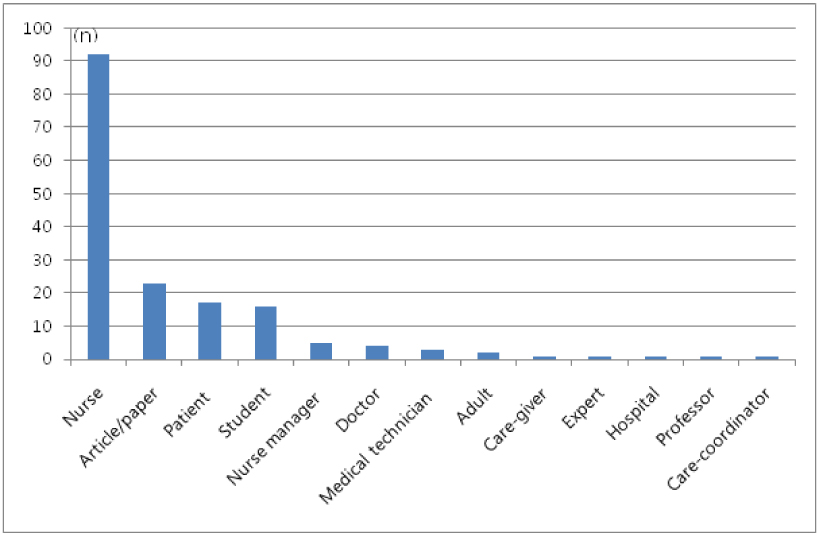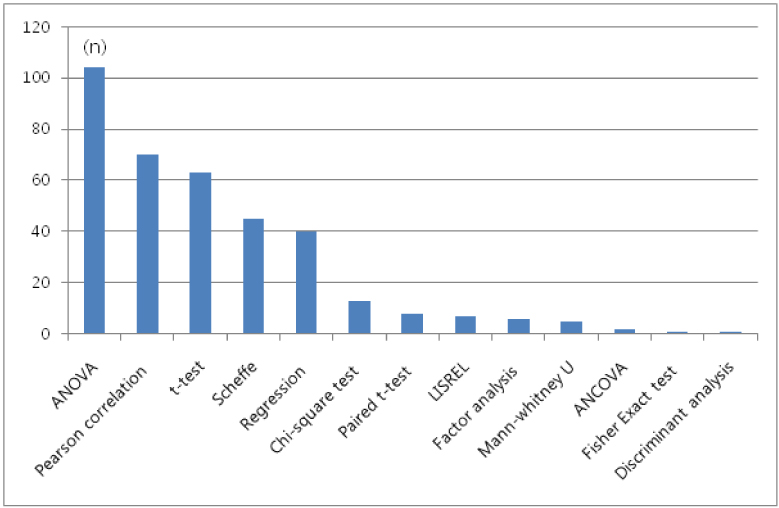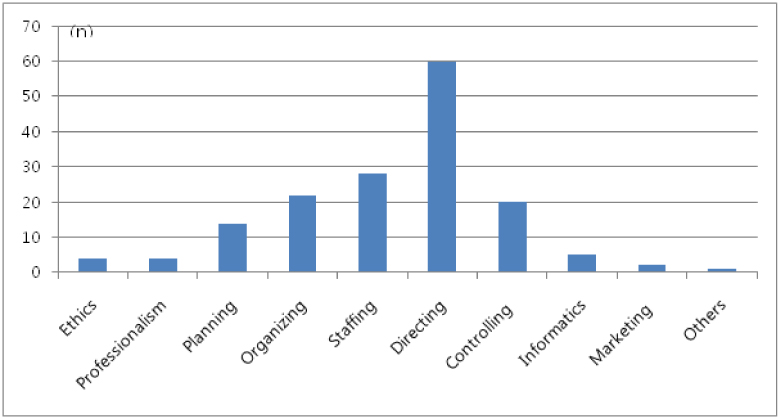J Korean Acad Nurs Adm.
2010 Dec;16(4):517-526.
Analysis of the Journal of Korean Academy of Nursing Administration for 3 Years (2007-2009)
- Affiliations
-
- 1Department of Nursing, Dankook University, Korea. jongkimk@dankook.ac.kr
- 2College of Nursing, Gyeongsang National University, Institute of Health Sciences, GNU, Korea.
- 3College of Nursing, Chonnam National University, Chonnam Research Institute of Nursing Science, Korea.
- 4College of Nursing, Seoul National University, Korea.
- 5Department of Nursing University, Mokpo National University, Korea.
- 6College of Nursing, Pusan National University, Korea.
- 7Nursing Director, Department of Nursing, Seoul National University Hospital, Korea.
- 8College of Nursing, Eulji University, Korea.
- 9Department of Nursing, Kyungwon University, Korea.
Abstract
- PURPOSE
The purpose of this study was to identify the major trends of research in the Journal of Korean Nursing Administration from 2007 to 2009. METHOD: Research designs, participants, research domains, and key words were analyzed from the Journal of Korean Nursing Administration.
RESULTS
Job satisfaction, organizational commitment, job stress, turnover intention, nursing performance, self-efficiency, leadership, empowerment, nursing informatics, and quality control were the major key words commonly listed in the journal articles. Of the research in the Nursing Administration Journal, quantitative methods were used in 94.5% of the research studies and qualitative methods in only 5.5%. The major participants in the research were nurses, nurse managers, and patients. Statistical methods like ANOVA, correlation, t-test, regression, chi-square test, LISREL were the dominant method of analysis used in the research. The primary domains in the journal articles were directing, organizing, control, planning, and informatics.
CONCLUSION
Through this study, the trend of research in nursing administration can be identified. We recommend that collaboration, nurse work environment, evidence-based practice, scheduling, coaching, patient falls and safety, and positive culture should be included as topics for the future research.
Keyword
MeSH Terms
Figure
Reference
-
1. Bang KS, Lee SO, Park YI, Jun MH, Kim HS, Son HM, Kang JH, Yu SJ. Analysis of published papers and their keywords in the Journal of Korean Academic Society of nursing education 2007. J Korean Acad Soc Nurs Educ. 2008. 14(2):244–251.
Article2. Choe MA, Jeong JS, Lim KC, Kim JH, Kim KS, Kwon JS, Kim SJ, Kim KH, Kwak CY, Park KO, Lee KE, Kim ES, Lee KS. Research trend of studies published in Journal of Korean Clinical Nursing Research. J Korean Clin Nurs Res. 2010. 16(2):95–105.3. Gillies DA. Nursing management: A system approach. 1994. Philadelphia: Saunders.4. Jeong GH, Ahn YM, Cho DS. Coincidence analysis of keywords of the Journal of Korean Academy of Nursing with Mesh. J Korean Acad Nurs. 2005. 35(7):1420–1425.
Article5. Jones GR, George JM, Hill CW. Contemporary management. 2000. 2nd ed. New York: Mcgrow Hill.6. Kim MS, Chi SA, Park KO, Kim IS, Park HT. The direction of nursing management domain for nursing personal licensing examination board. J Korean Acad Nurs Adm. 2002. 8(4):515–534.7. Kim SJ, Kim KB, Yi MS, Lee KJ, Ahn YH, Kim HS, Park YJ, Koh MS, Sohng KY. The trends of nursing research in the Journals of Seven Branches of the Korean Academy of Nursing. J Korean Acad Nurs. 2002. 32(1):114–130.
Article8. Kim JI, Lee EH, Oh HE, Lee EJ, Jun EM, Cheon SH. Analysis of published papers by keywords and research methods in the Korean Journal of Women Health Nursing. Korean J Women Health Nurs. 2010. 16(3):307–316.
Article9. Kim MS, Chi SA, Park KO, Kim IS, Park HT. The direction of nursing management domain for nursing personal licencing examination board. J Korean Acad Nurs Adm. 2002. 8(4):515–534.10. Kim IS, Jang KS, Lee MH, Ha NS, Hong YM, Lee TH, Kim JS, Kang KH. Nursing management. 2009. Seoul: Soomoonsa.11. Koh MS, Ha NS. Review of the Journal of Korean Nursing Administration Academic society and its research. J Korean Acad Nurs Adm. 2001. 7(3):561–569.12. Lee EO, Im NY, Park HA. Nursing research and statistical analysis. 2009. Seoul: SooMoonsa.13. Lee MH, Sohn JN, Won CS, Chung MS, Hyun MS, Han KS, Kim CS. Trend of psychiatric nursing research by analysis of the published paper in Journal of Korean Academy of Psychiatric and metal health Nursing: on papers from 1992 to 2006. J Korean Acad Psychiatr Ment Health Nurs. 2007. 6(3):295–307.14. Lee BS, et al. Nursing management. 2008. Seoul: Jungdammedia.15. Marriner-Tomey A. Nursing management and leadership. 2000. 6th ed. Philadelphia: Mosby.16. Park SA. Nursing management. 2005. Seoul: Pakmoongak.17. Seomun GA, Koh MS. Academic value and outcome of the Journal of Korean Academy of Nursing Administration. J Korean Acad Nurs Adm. 2007. 13(4):546–552.18. Seomun GA, Koh MS, Kim IA. Classification of keywords of the papers from the Journal of Korean Academy of Nursing Administration (2002-2006). J Korean Acad Nurs Adm. 2007. 13(1):118–122.19. Shin HS, Hyun MS, Ku MO, Cho MO, Kim SY, Jeong JS, Jeong GH, Seomoon GA, Son YJ. Analysis of research papers published in the Journal of the Korean Academy of Nursing-focused on research trends, intervention studies, and level of evidence in the research. J Korean Acad Nurs. 2010. 40(1):139–149.
Article20. Sohng KY, Kim JI, Choi DW, Kim AK, Chaung SK, Kim KH, Park SN, Pai J, Lim NY, Chang SO. Research Trends in the journal of Korean Academy of Fundamental Nursing-based on analysis of the Journal of Korean Academy of Fundamental Nursing from 2001 to 2007. J Korean Acad Fundam Nurs. 2008. 15(3):262–273.21. Suh YO, Park JS, Yang JH, Kim HW, Suk MH, Shin HS, Jang HJ, Jung MS, Chung MS. Analysis of research paoers published in the Journal of Korean Academy of Nursing. J Korean Acad Nurs. 2007. 37(6):1013–1019.
Article
- Full Text Links
- Actions
-
Cited
- CITED
-
- Close
- Share
- Similar articles
-
- Analysis of Theory-applied Research in the Journal of Korean Academy of Nursing Administration (2007~2016)
- Analysis of Research Articles Published in the Journal of Korean Academy of Nursing Administration for 3 Years (2010~2012)
- Analysis of Research Articles Published in the Journal of Korean Academy of Nursing Administration for 3 Years (2013~2015): The Application of Text Network Analysis
- Use and Misuse of Statistical Methods in the Journal of Korean Academy of Nursing Administration
- Direction for Development of the Journal of Korean Academy of Adult Nursing through Analysis of Accepted and Rejected Papers (2007~2009)






